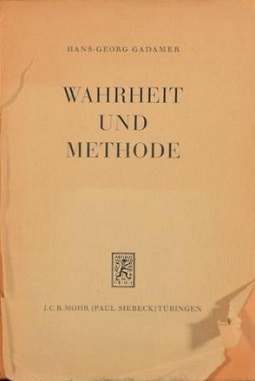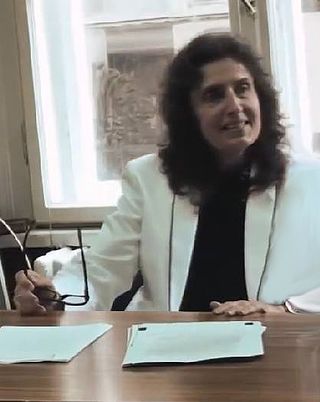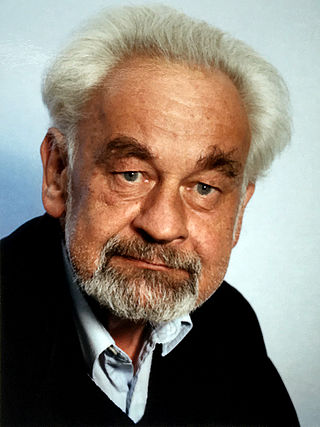Related Research Articles

Hans-Georg Gadamer was a German philosopher of the continental tradition, best known for his 1960 magnum opus, Truth and Method, on hermeneutics.

Hermeneutics is the theory and methodology of interpretation, especially the interpretation of biblical texts, wisdom literature, as well as philosophical texts. Hermeneutics is more than interpretative principles or methods used when immediate comprehension fails and includes the art of understanding and communication.
Phenomenology is the philosophical study of the structures of experience and consciousness. As a philosophical movement it was founded in the early years of the 20th century by Edmund Husserl and was later expanded upon by a circle of his followers at the universities of Göttingen and Munich in Germany. It then spread to France, the United States, and elsewhere, often in contexts far removed from Husserl's early work.

Continental philosophy is a term used to describe some philosophers and philosophical traditions that do not fall under the umbrella of analytic philosophy. However, there is no academic consensus on the definition of continental philosophy. Prior to the twentieth century, the term "continental" was used broadly to refer to philosophy from continental Europe. A different use of the term originated among English-speaking philosophers in the second half of the 20th century, who used it to refer to a range of thinkers and traditions outside the analytic movement. Continental philosophy includes German idealism, phenomenology, existentialism, hermeneutics, structuralism, post-structuralism, deconstruction, French feminism, psychoanalytic theory, and the critical theory of the Frankfurt School as well as branches of Freudian, Hegelian and Western Marxist views.

Jean Paul Gustave Ricœur was a French philosopher best known for combining phenomenological description with hermeneutics. As such, his thought is within the same tradition as other major hermeneutic phenomenologists, Martin Heidegger, Hans-Georg Gadamer, and Gabriel Marcel. In 2000, he was awarded the Kyoto Prize in Arts and Philosophy for having "revolutionized the methods of hermeneutic phenomenology, expanding the study of textual interpretation to include the broad yet concrete domains of mythology, biblical exegesis, psychoanalysis, theory of metaphor, and narrative theory."

Wilhelm Dilthey was a German historian, psychologist, sociologist, and hermeneutic philosopher, who held G. W. F. Hegel's Chair in Philosophy at the University of Berlin. As a polymathic philosopher, working in a modern research university, Dilthey's research interests revolved around questions of scientific methodology, historical evidence and history's status as a science. He could be considered an empiricist, in contrast to the idealism prevalent in Germany at the time, but his account of what constitutes the empirical and experiential differs from British empiricism and positivism in its central epistemological and ontological assumptions, which are drawn from German literary and philosophical traditions.
Georg Misch was a German philosopher.

Philosophical anthropology, sometimes called anthropological philosophy, is a discipline dealing with questions of metaphysics and phenomenology of the human person.
Robert L. Bernasconi is Edwin Erle Sparks Professor of Philosophy at Pennsylvania State University. He is known as a reader of Martin Heidegger and Emmanuel Levinas, and for his work on the concept of race. He has also written on the history of philosophy.
Babette E. Babich is an American philosopher who writes from a continental perspective on aesthetics, philosophy of science and technology in addition to critical and cultural theory.

Studia Phaenomenologica is a peer-reviewed academic journal dedicated to the study of phenomenology and hermeneutics. It was established in 2001 by the Romanian Society for Phenomenology, and the founding editors-in-chief were Gabriel Cercel and Cristian Ciocan. The journal is currently published by Zeta Books. All issues are available online from the Philosophy Documentation Center.
Hugh J. Silverman was an American philosopher and cultural theorist whose writing, lecturing, teaching, editing, and international conferencing participated in the development of a postmodern network. He was executive director of the International Association for Philosophy and Literature and professor of philosophy and comparative literary and cultural studies at Stony Brook University, where he was also affiliated with the Department of Art and the Department of European Languages, Literatures, and Cultures. He was program director for the Stony Brook Advanced Graduate Certificate in Art and Philosophy. He was also co-founder and co-director of the annual International Philosophical Seminar since 1991 in South Tyrol, Italy. From 1980 to 1986, he served as executive co-director of the Society for Phenomenology and Existential Philosophy. His work draws upon deconstruction, hermeneutics, semiotics, phenomenology, aesthetics, art theory, film theory, and the archeology of knowledge.

Truth and Method is a 1960 book by the philosopher Hans-Georg Gadamer, in which the author deploys the concept of "philosophical hermeneutics" as it is worked out in Martin Heidegger's Being and Time (1927). The book is considered Gadamer's major work.
Dermot Moran is an Irish philosopher specialising in phenomenology and in medieval philosophy, and he is also active in the dialogue between analytic and continental philosophy. He is currently the inaugural holder of the Joseph Chair in Catholic Philosophy at Boston College. He is a member of the Royal Irish Academy and a founding editor of the International Journal of Philosophical Studies.
The following is a bibliography of John D. Caputo's works. Caputo is an American philosopher closely associated with postmodern Christianity.

Andrzej Wiercinski is a Hermeneutician, Philosopher, and Theologian. As the transdisciplinary thinker, he is Professor of Liberal Arts, Faculty of Artes Liberales at the University of Warsaw, President-Founder (2001) of the International Institute for Hermeneutics (IIH), and President of Agora Hermeneutica (IIH).

Yvanka B. Raynova is a Bulgarian philosopher, feminist, editor, translator, and publisher. She is full professor of contemporary philosophy at the Institute of Philosophy and Sociology at the Bulgarian Academy of Sciences and director of the Institute for Axiological Research in Vienna. She elaborated a post-personalist hermeneutic phenomenology based on some gnostic ideas. Her works include studies on continental philosophy, phenomenology, hermeneutics, axiology, feminist philosophy, intercultural philosophy, religious studies, and translation studies.

Thomas Seebohm was a phenomenological philosopher whose wide-ranging interests included, among others, Immanuel Kant, Edmund Husserl, hermeneutics, and logic. Other areas of Professor Seebohm's interests included the history of philosophy, philosophy of history, philosophy of the formal sciences, methodology and philosophy of the human sciences, the history of 19th century British Empiricism, American pragmatism, analytic philosophy, philosophy of law and practical philosophy, and the development of the history of philosophy in Eastern Europe. Despite this diverse span of interests, Seebohm was chiefly known as a phenomenologist, who "above all...considered himself a creative phenomenologist, who as a critically reflecting philosopher would look at all major issues with which he became confronted, from a transcendental phenomenological point of view."
Theodore D. George is an American philosopher and professor and chair of the department of philosophy at Texas A&M University. He is known for his expertise on post-Kantian philosophy and hermeneutics, in particular, his work on Hans-Georg Gadamer. George is the editor of Epoché: A Journal for the History of Philosophy. He was the president of North American Society for Philosophical Hermeneutics between 2013 and 2016.

Jean-Louis Chrétien was a French philosopher in the tradition of phenomenology as well as a poet and religious thinker. Author of over thirty books, he was the 2012 winner of the Cardinal Lustiger Prize for his life’s work in philosophy. He was professor emeritus of philosophy at the Sorbonne at the end of his career. The study of Chrétien increased widely after his death, a posthumous recognition that contrasts with his modest and solitary attitude.
References
- ↑ "GRONDIN, Jean - Département de philosophie / UdeM". Archived from the original on 2013-09-20. Retrieved 2011-12-23.
- ↑ "Appointments to the Order of Canada". Governor General of Canada . Retrieved December 31, 2012.
- ↑ "Métis fiddler and philosophy professor win Molson Prizes". Canada Council for the Arts. May 21, 2014. Retrieved 2015-03-03.
- ↑ J. Grondin, Hermeneutische Wahrheit? Zum Wahrheitsbegriff Hans-Georg Gadamers (Hanstein: Forum Academicum, 1982).
- ↑ J. Grondin, Hans-Georg Gadamer: A Biography (New Haven: Yale University Press, 2003).
- ↑ J. Grondin, L'universalité de l'herméneutique (Paris: PUF, 1993).
- ↑ "Jean GRONDIN".
- ↑ "Grondin Jean - Répertoire du département - Département de philosophie - Université de Montréal". Archived from the original on 2016-03-04. Retrieved 2014-05-10.